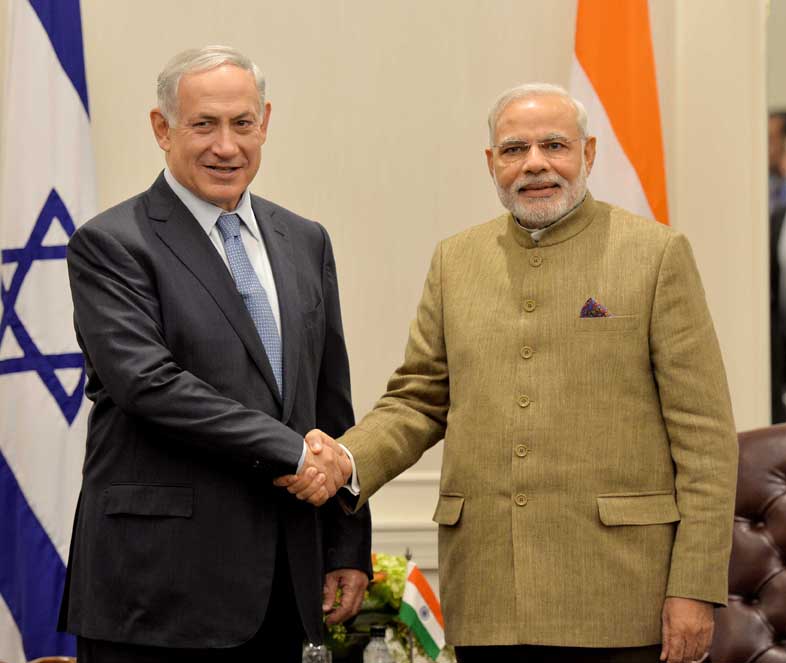FRESH AIR
Indian PM set to make history by visiting Israel
June 30, 2017 | Sharyn Mittelman

Next week India’s Prime Minister Narendra Modi will make history as the first ever sitting Indian prime minister to visit Israel. The visit marks the 25th anniversary of the establishment of full diplomatic relations between Israel and India.
Diplomatic ties began at the end of the cold war in 1992, and since that time the relationship has grown rapidly. Today Israel is one of the largest military suppliers to India, and Israeli agricultural technologies are helping feed India’s huge population. Trade and investment between Israel and India has also flourished and is now estimated at around US$6 billion annually.
The political relationship has deepened since Modi’s Bharatiya Janara Party (BJP) came to power in 2014. The BJP emphasises Hindu identity and has shown a particular interest in strengthening ties with Israel. This can be seen in recent high profile visits including Indian President Pranab Mukherjee trip to Israel in 2015, and Israeli President’s Reuven Rivlin’s visit to India last year.
Modi has already been to Israel as the chief minister in the western state of Gujarat in 2006, but this marks the first time an Indian Prime Minister will visit Israel.
In the lead up to Modi’s visit, Israel’s cabinet approved a series of measures on June 25, aimed at strengthening the relationship between the two countries. According to Globes, the measures included:
“Establishing a joint NIS 140 million Israeli-Indian fund for encouraging Israeli and Indian companies on the basis of innovation and R&D.
Launching a range of assistance tools for Israeli companies exporting to India, with a large budget allocation.
Measures for substantially increasing the number of Indian tourists in Israel within four years, among other things through a movie filmed by the Indian cinema industry (Bollywood) in Israel.
Devising a joint Israeli-Indian government project for water and agriculture, with cooperation from the World Bank andother financial agencies. Expanding academic cooperation and cooperation between space and cyber agencies.”
Israel and India already have a strong defence trade relationship, but this upcoming trip is expected to focus on water management, agriculture and technology. In April, Israel Aerospace Industries announced it had been awarded a US$2 billion Indian military hardware deal, considered to be “the largest defense contract in Israel’s defense industries’ history.” The defence relationship also stretches beyond arms trade to include counter-terrorism, cyber security, homeland security, border management and intelligence sharing.
Commenting on Modi’s upcoming visit, Israel’s Prime Minister Benjamin Netanyahu said, “Relations between Israel and India have become closer than ever before in recent years. The Indian economy is one of the world’s largest and fastest-growing economies. We have similar challenges in many areas. The Indian prime minister’s visit to Israel constitutes another significant step in joint efforts and strengthening strategic cooperation between the two countries.”
Regarding the Israeli-Arab conflict, India has generally attempted to remain neutral. In advance of Modi’s trip to Israel, last month Modi met with Palestinian Authority President Mahmoud Abbas for a three-day state visit to India, and last year Modi visited Saudi Arabia, Iran, and Qatar.
However, some commentators believe that Modi’s decision to visit Israel (and not the Palestinian territories) on this trip appears to be a symbolic shift, as Shafeeq Rahman writes in the Diplomat:
“Modi’s decision on a visit to Israel might be a sign of new political logic: namely, that India should expand the relationship with Israel by rejecting the old trend of balance diplomacy with Arab states. Israel, of course, has openly supported India’s stance on the Kashmir dispute several times at international forums, while most of the Arab countries have allied with Pakistan, nullifying India’s cause of combating cross-border terrorism.”
This was also echoed by P.R. Kumaraswamy in the Indian Express:
“By not visiting Ramallah, Modi will be seen as brave enough to come out of the closet and be prepared to deal with Israel. Some believe that, henceforth, Palestine’s importance and influence in India and other parts of the Third World will be drastically reduced. Perhaps that will also push Mahmoud Abbas to be more flexible in his negotiations with the Israelis.”
While Israel and India have a growing trade relationship, many believe it only scratches the surface of what can be achieved, especially in the Israeli start-up business space. As Meirav Arlosoroff wrote in Haaretz:
“India is the second-most populous country in the world, with 1.3 billion citizens; in a decade, its population is expected to outstrip China’s. India attracted $44 billion in foreign investment in 2015 – more than China. Yet despite also being a flourishing democracy and viewing Israel as a partner, Israeli exports to India only totaled $1.2 billion last year, just 3% of total Israeli exports.”
Modi’s visit to Israel is a wonderful opportunity for Israel and India to expand both their economic and political ties. While the relationship has been steadily developing in the dark, with Modi’s upcoming visit to Israel, it is now ready to shine.
Sharyn Mittelman
RELATED ARTICLES

He survived Bondi. Now he’s fighting back: Arsen Ostrovsky addresses AIPAC conference

US Middle East strategy amid regional instability: Dana Stroul at the Sydney Institute





















